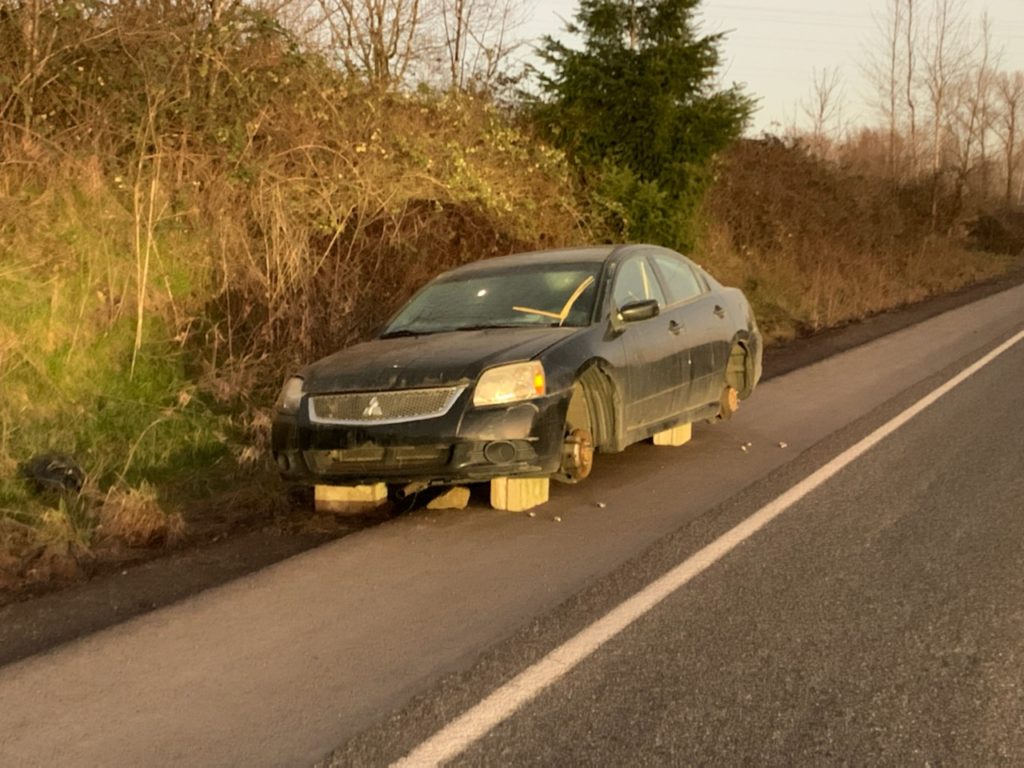Note: The following op-ed appeared in the Tri-City Herald March 5, 2023.
As the Washington Legislature debated the catalytic converter bill last session, someone parked this car across the street from my house in Longview. Within days, thieves had it up on blocks, the wheels were stripped and the catalytic converter was lopped off the tailpipe. It was as if someone was trying to send me a message – don’t give up on the bill. Courtesy photo by Sen. Jeff Wilson, R-Longview.
BY SEN. JEFF WILSON, R-LONGVIEW
When workers in the Woodland School District showed up early on the morning of Jan. 23, they heard power saws in the bus parking lot. The thieves heard them coming and scattered, dropping their tools and a few of the catalytic converters they had lopped from school-bus tailpipes. They all got away. They always do.
This was the fourth time the district had been hit. The previous time, the district installed hardened-steel cages underneath its school buses, to shield the valuable converters. The thieves sawed right through them. They did a total $24,000 damage.
We are hearing stories like this everywhere — from school districts in every part of the state, from apartment dwellers in Redmond, shoppers in downtown Longview and people who stall along the shoulder of I-182 in the Tri-Cities. Washington has become a national leader in our country’s epidemic of catalytic converter theft, with about 4,000 reported cases in 2021. That was enough to rank us Number Three, according to the National Insurance Crime Bureau — and we may score higher when 2022 numbers are released.
There really is something we can do about it. It begins by recognizing catalytic converter theft is an organized crime. The chain starts with the petty thief who climbs under your car with a power saw. Then someone has to buy what he steals, someone has to “de-can” the catalytic converters, and someone has to get them to the recycler who strips and resells the precious metals and reaps the final reward.
Law enforcement tells us these criminal supply chains appear to be especially strong in the Pacific Coast states, some feeding recyclers in the eastern part of the country. The state of Oregon has broken several of these networks, busting ringleaders and putting heat at the top. Washington should do the same.
That’s why I am sponsoring Senate Bill 5740, which creates a new Class B felony, trafficking in stolen catalytic converters. Anyone who knowingly traffics in stolen converters, and purchases five or more used catalytic converters without a scrap dealer’s license, could receive a prison sentence up to 7 years.
For all the argument we have had in the Legislature these last two years about public safety and law enforcement, I think Republicans and Democrats can reach agreement on catalytic converters. We know we won’t get far merely by dealing with the thief who wields the saw. We need to look further up the chain, at those who drive these crimes with shadowy cash-for-converters transactions. I have been impressed by the pledges of cooperation and support I am hearing from my colleagues — this is truly a bipartisan issue.
Getting at the criminal supply chain has been my idea ever since I introduced Washington’s first bill on catalytic converter theft in December 2021. My initial goal was to prevent stolen converters from entering our state’s legal scrap metal recycling channels. We made progress last year with House Bill 1815, which prohibits scrap dealers from making cash payments on the spot, and requires photo ID and meticulous record-keeping.
We also came up with a plan for law enforcement involvement at high levels — funding for local-police sting operations, expansion of the state’s “no-buy database” of suspected metal thieves, and development of a comprehensive strategy against metal theft. Sadly, these priorities were not funded in last year’s budget, but I am working for a $2.2 million appropriation for these purposes this year.
Right now, there also is discussion of a state program to etch vehicle ID numbers into catalytic converters. This plan leaves me cold, as this merely allows us to track crime, not prevent it. But as long as this comes in addition to a strategy involving law enforcement, and doesn’t replace it, I see no harm.
I think about the impact this crime has on all of us in this state, from the special-ed kids in the Woodland School District who couldn’t get to school because their wheelchair-lift buses were in the shop, to the working people who start their cars in the morning, hear a blast from the tailpipe, and face a repair bill of $1,000 or more. In the final weeks of the 2023 session, I think we will see quite a bit of activity on this issue — and I hope the people will hold us to it.
Sen. Jeff Wilson, R-Longview, represents the 19th Legislative District.









